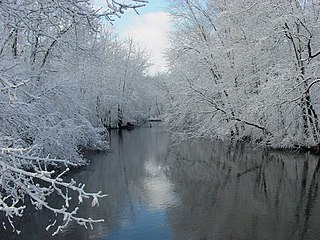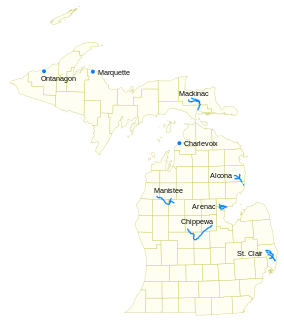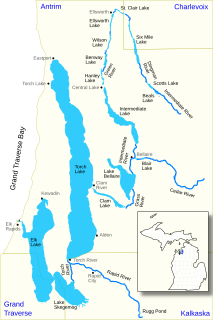| Baldwin River | |
|---|---|
| Country | United States |
| Physical characteristics | |
| Main source | Lake County, Michigan |
| River mouth | Pere Marquette River 817 ft (249 m) [1] |
The Baldwin River is a 25.2-mile-long (40.6 km) [2] stream in the U.S. state of Michigan.

A stream is a body of water with surface water flowing within the bed and banks of a channel. The stream encompasses surface and groundwater fluxes that respond to geological, geomorphological, hydrological and biotic controls.
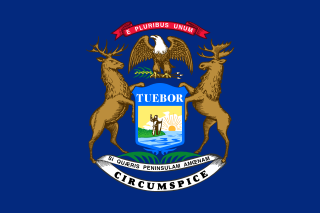
Michigan is a state in the Great Lakes and Midwestern regions of the United States. The state's name, Michigan, originates from the Ojibwe word mishigamaa, meaning "large water" or "large lake". With a population of about 10 million, Michigan is the tenth most populous of the 50 United States, with the 11th most extensive total area, and is the largest state by total area east of the Mississippi River. Its capital is Lansing, and its largest city is Detroit. Metro Detroit is among the nation's most populous and largest metropolitan economies.
The river rises out of Wide Waters [3] on the southern edge of the Baldwin Luther Swamp [4] in Newkirk Township, Lake County at 43°59′32″N85°45′58″W / 43.99222°N 85.76611°W . Several tributaries rise in the hills to the east of the swamp, and one stream labeled as the Baldwin River on USGS topographic maps rises in section 23 just southwest of the village of Luther.

Lake County is a county located in the U.S. state of Michigan. As of the 2010 census, the population was 11,539. The county seat is Baldwin.

Luther is a village in Lake County in the U.S. state of Michigan. The population was 318 at the 2010 census. The village is on the boundary between Newkirk Township on the west and Ellsworth Township on the east, with about half of the village in each. It is the site of Hillsdale College's G.H. Gordon Biological Research Station.
The river flows south into Cherry Valley Township then to the southwest into the village of Baldwin, where it is joined by Sanborn Creek. The GNIS entry for Baldwin River records the mouth as being on the Sanborn Creek at 43°53′27″N85°50′44″W / 43.89083°N 85.84556°W . [1] However, USGS topographic maps show the stream continuing southwest into the Pere Marquette River labeled as both the Baldwin River and Sanborn Creek. The GNIS entry for Sanborn Creek indicates it is also known as the Baldwin River. The stream empties into the Pere Marquette at 43°51′36″N85°52′20″W / 43.86000°N 85.87222°W [5] and thence into Lake Michigan.

Cherry Valley Township is a civil township of Lake County in the U.S. state of Michigan. The population was 368 at the 2000 census.
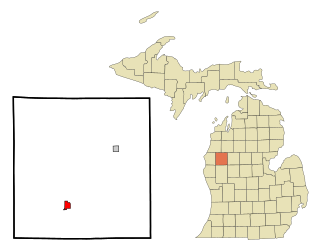
Baldwin is a village in the U.S. state of Michigan. The population was 1,208 at the 2010 census. It is the county seat of Lake County. The village is located on the boundary between Webber Township on the north and Pleasant Plains Township on the south, with the larger portion lying in Pleasant Plains.

The Pere Marquette River is a river in Michigan in the United States. The main stream of this river is 63.9 miles (102.8 km) long, running from Lake County south of Baldwin into the Pere Marquette Lake, and from there into Lake Michigan.
The river is notable in American history as the location of the first introduction of brown trout (Salmo trutta) into U.S. waters when on April 11, 1884 the U.S. Fish Commission released 4900 brown trout fry from the Northville, Michigan fish hatchery into the river. [6]

The brown trout is a European species of salmonid fish that has been widely introduced into suitable environments globally. It includes both purely freshwater populations, referred to as the riverine ecotype, Salmo trutta morpha fario, and a lacustrine ecotype, S. trutta morpha lacustris, also called the lake trout, as well as anadromous forms known as the sea trout, S. trutta morpha trutta. The latter migrates to the oceans for much of its life and returns to fresh water only to spawn. Sea trout in the Ireland and Britain have many regional names: sewin in Wales, finnock in Scotland, peal in the West Country, mort in North West England, and white trout in Ireland.

The United States Fish and Wildlife Service is an agency of the US Federal Government within the US Department of the Interior dedicated to the management of fish, wildlife, and natural habitats. The mission of the agency is "working with others to conserve, protect, and enhance fish, wildlife, plants and their habitats for the continuing benefit of the American people."

Northville is a city located in and divided by Oakland and Wayne counties in the U.S. state of Michigan. The area is a suburb of Metropolitan Detroit. The population was 5,970 at the 2010 census. Most of the city is in Oakland County and is surrounded by the city of Novi, while the other part is in Wayne County and is surrounded by Northville Township. Northville is served by Northville Public Schools. The city is located 21 miles (34 km) northeast of Ann Arbor and 29 miles (47 km) northwest of Detroit.
